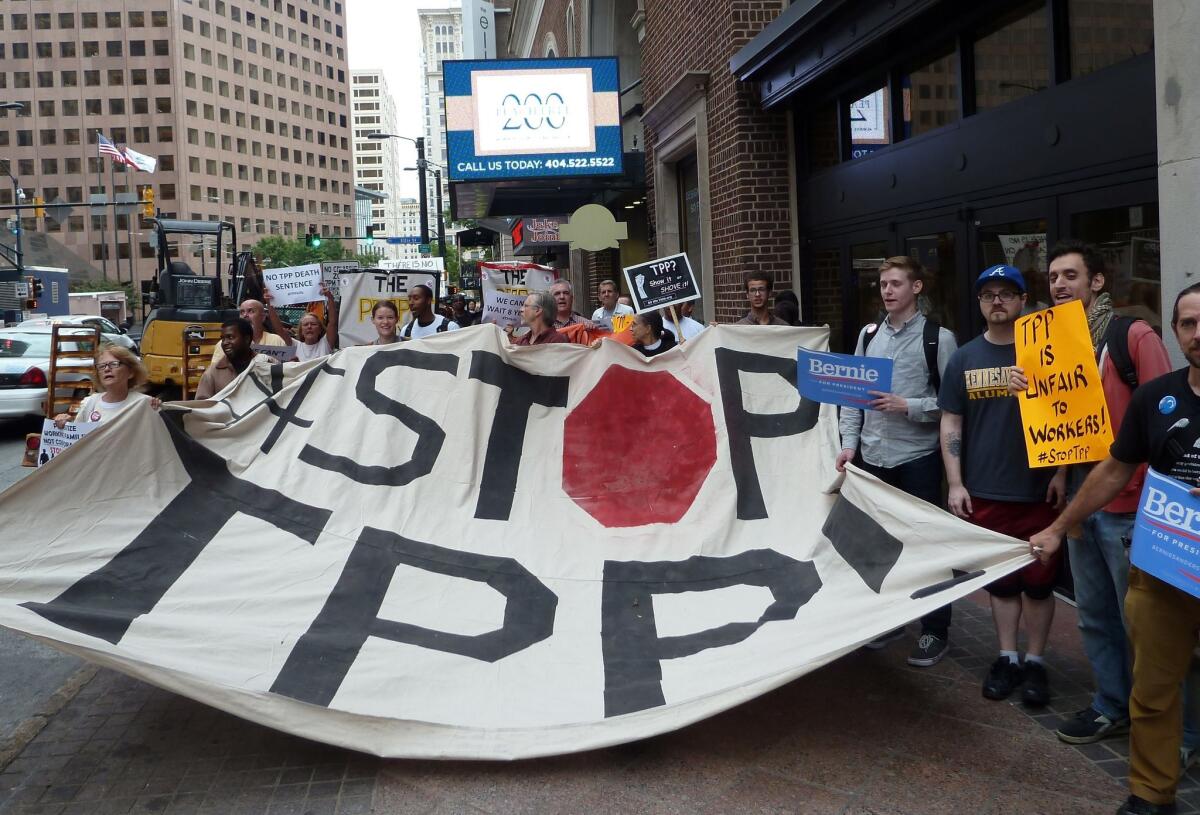Readers React: The American casualties of free trade

Protestors call for the rejection of the proposed Trans-Pacific Partnership in Atlanta last October.
- Share via
To the editor: Economist Mark J. Perry upbraids presidential candidates Sen. Bernie Sanders (I-Vt.) and Donald Trump for “spewing gibberish” over international trade, and Trump in particular for citing inaccurate numbers. Contrast that with the probable accuracy of his own acknowledgment that “some” American businesses may close and “some” workers may lose their jobs. (“Trump is completely wrong about the U.S. trade deficit,” Opinion, March 16)
We might complain over Perry’s level of precision, but less precision may be warranted for mere human losses as compared with vital abstractions such as trade deficits. This must be where Sanders and Trump err.
Former Rep. Betty Sutton (D-Ohio) calculated from Bureau of Labor Statistics data that the U.S. lost just more than 15 factories each day from the beginning of 2001 to the end of 2010. Let Perry explain whether it’s those 15 or the 56,000 decadal losses that are “some.”
If that is too tedious, then he should examine whether more than a generation of trade-related de-industrialization in this country represents “short term” loss.
Curtis Selph, Lancaster
..
To the editor: Thanks to The Times for printing a decent and accurate piece about free markets and free trade. “Fair trade” has become the latest buzzword for protectionists, which ironically protects consumers from wider markets and lower prices.
If every country adopted the Pat Buchanan model of foreign investment — meaning none — the entire economy would collapse. Free trade is the fairest form of trade, because both parties benefit.
During the Great Depression, the U.S. ran trade surpluses, and millions of Americans were lining up for bread. With free trade and the lower prices that accompany it, milk, bread and all kinds of other goods line up for consumers.
As for the loss of jobs overseas, the fault lies with a bad educational system that diminishes trade schools and puffs up useless college degrees, which have hurt American workers’ job prospects.
Arthur Christopher Schaper, Torrance
..
To the editor: I’m sure some people would not mind getting a lower price for their purchase even if that price was made possible by using slave or child labor, polluting the air, land or water, harvesting resources beyond the planet’s ability to recover or forcing workers to toil in filthy and unsafe conditions.
I want our government to set the standards for what is allowed to be imported into this country, not some consortium of multinational corporations with allegiance only to their bottom line.
Perry seems to ignore the fact that people other than the buyer and seller are affected by trade. Studies published in the Journal of Geophysical Research: Atmospheres found that 20% of the total ozone pollution in the spring in California originates from Asia. Free trade can endanger the lives and livelihood of innocent uninvolved parties and destroy the productivity of the land and water, not to mention make toxic the very air we breathe.
We don’t need free trade, we need fair trade that that is sustainable and beneficial to all, not just the buyer and seller.
Tom Hazelleaf, Seal Beach
..
To the editor: For validation of the expert “consensus” on the benefits of free trade agreements, University of Michigan-Flint economist Mark J. Perry need look no farther than the roaring economic powerhouse that is the community surrounding him.
Steven Malkson, La Crescenta
Follow the Opinion section on Twitter @latimesopinion and Facebook
More to Read
A cure for the common opinion
Get thought-provoking perspectives with our weekly newsletter.
You may occasionally receive promotional content from the Los Angeles Times.









